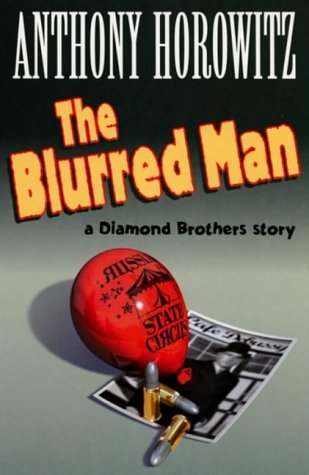Anthony Horowitz – The Blurred Man
Anthony Horowitz’s Alex Rider series landed among the late millennials like a drop pod of Space Marines, which we were all collecting. They were, to quote Blackadder, full of capture, torture, escape, and back home in time for tea and medals. Even the cool kids at my school, the casual, uncommitted bullies, were reading Stormbreaker, Point Blanc and Scorpia; lesser spotted were the Diamond Brothers books, in which Horowitz indulges a love of classic noir and black comedy. I worked my way through the punning titles – The Falcon’s Malteser, South By South East, The French Confection – and last week I picked up The Blurred Man for the first time in twenty years, curious to see how my response at thirty differed from that at ten.

The Diamond Brothers are Tim and Nick. Tim is a very stupid private eye; Nick is a smart, smirky fourteen-year-old. They live together in London and poverty, their parents having moved to Australia. Nick is the first-person narrator of the novels, which nicely inverts the traditional pairing of genius detective/slow-witted sidekick, a generic convention that grew out of the former’s need for someone to whom they could articulate their sleuthing. The Blurred Man is a fuzzy photograph of a reclusive philanthropist called Lenny Smile, whose children’s charity, Dream Time, has received two million dollars from American crime novelist Jack Carter. Carter has arrived in London to meet his beneficiary in person; unfortunately, Smile died a few days before his arrival. And Horowitz doesn’t spare his young target audience: Smile was accidentally run over by a steamroller, which tees up a string of queasy jokes when Nick and Tim go to visit the gibbering wreck of a driver.
“It must have been a crushing experience,” Tim began.
Krishner whimpered and twisted in his chair. Dr Eams frowned at Tim, then gently took hold of Krishner’s arm. “Are you all right, Barry?” he asked. “Would you like me to get you a drink?”
“Good idea,” Tim agreed. “Why not have a squash?”
Krishner shrieked. His glasses had slipped off his nose and one of his eyes had gone bloodshot.
“Mr Diamond!” Eams was angry now. “Please could you be careful what you say. You told me you were going to ask Barry what he saw outside Lenny Smile’s house.”
“Flat,” Tim corrected him.
The humour in The Blurred Man comes from two sources, the witty Nick and the unwitting Tim, with inconsistent success. The latter is too gormless to be truly credible; as P. D. James observed, the Watson should be only slightly less intelligent than the reader. Nick, meanwhile, is constantly firing off wisecracks both as character and narrator, some of which betray a pungent nastiness: one old woman has a face “that had long ago given up trying to look human”. Considering Smile’s associates Rodney Hoover and Fiona Lee, he concludes that “they could have thrown him in front of the steamroller – but if so, why? As Tim would doubtless have said, they’d have needed a pressing reason.” That’s one of the better gags, but I have to admit that at no point, twenty years on, did I laugh out loud – though I’m pretty sure there’s at least one that I didn’t get on my first reading:
“I’m still at the Ritz,” Carter said. “Ask for Room 8.”
“I’ll ask for you,” Tim said. “But if you’re out, I suppose the room-mate will have to do.”
Then again, I never opened these books for the quips. The Diamond Brothers were responsible for putting me on the mystery trail; they were really the first whodunnits I ever encountered. And Horowitz may think kids are easily amused, but he doesn’t underestimate their grasp of human vice and venality. For British readers, a rotten charity that notionally makes children’s dreams come true has a sickly relevance. Nor, crucially, does the plot condescend to cheap tricks that any adult could see through. Readers can make up their own minds about the streak of grotesquerie, but jokes aside, The Blurred Man is a satisfying, unsaccharine little tale.
The Blurred Man was published by Walker and is available here